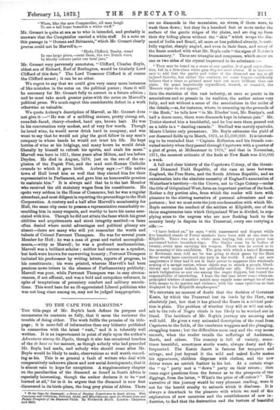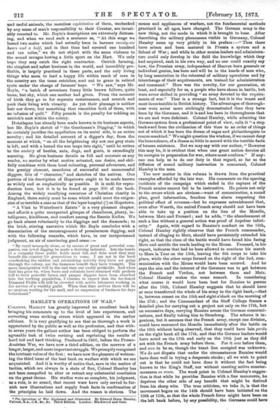TO THE CAPE FOR DIAMONDS.*
'THE title-page of Mr. Boyle's book defines its purpose and enumerates its contents so fully, that it saves the reviewer the trouble of doing either. The work fulfils the promise of its title- page ; it is more full of information than any hitherto published in connection with the latest "rush," and it is tolerably well written. It is an improvement in point of style upon the author's Adventures among the Dyaks, though it also has occasional touches .of the de haut en bas manner, as though nobody who had preceded Mr. Boyle had made, and nobody who should come after Mr. Boyle would be likely to make, observations so well worth record- ing as his. This is so general a fault of writers who deal with -comparatively unknown places and new social developments, that it is almost vain to hope for exceptions. A. supplementary chapter on the peculiarities of the diamond as found in South Africa is especially interesting, though the author declares it to be "not learned at all," for in it he argues that the diamond is now first discovered in its birth-place, the long grey plains of Africa. There
* To the Cape for Diamonds: a Story of Digging Experiences in South Africa. With Continents and Criticisms, Political, Social, and Miscellaneous, upon the Present State and .Future Prospects of the Diamond Fields. By Frederick Boyle. London: Chapman And Hall.
are no diamonds in the mountains, no rivers, if there were, to wash them down ; but they lie a hundred feet or more under the surface of the gentle ridges of the plains, and are dug up from their dry hiding-places without the " skin " which wraps the die- mond.of India and Brazil, all more or leas polished already, beauti- fully regular, sharply angled, and even in their lines, and many of
the finest marked with what Mr. Boyle calls "the signs of Nature's freemasonry." These are triangles and compasses, which occur on
one or two aides of the crystal impressed in its substance :—
"They may be found on a stone of any quality, if of good erystillisa- tion, but in a first-class white gem they are never absent. It is unneces- sary to add that the purity and value of the diamond are not at all injured thereby, but rather the contrary, for some buyers confidently believe that a stone so printed must turn out more brilliant than one plain. On gems imperfectly crystallised, frosted, or rounded, the Masonic signs do not appear."
Into the statistics of this vast industry, at once so poetic in its associations and so prosaic: in its realities, the author enters very fully, and not without a sense of the associations in the midst of the details,—as, for instance, where, in summing up the proceeds of "the Rush," he tells how "in Mr. Rhodes' tent, Mr. Bantye's, and half a dozen more, there were diamonds kept in tobacco-jars." Mr. Truter showed him a tumblerful, and he has seen them poured out on a table in a " dazzling cascade." Sindbad was merely symbolic, Monte Christo only premature. Mr. Boyle estimates the yield of our diamond fields up to March, 1873, at £5,000,000. It is interest- ing to be reminded that "Captain Rolleston and his friends con- vulsed society when they passed through Capetown with a quarter of a pint of gems, at Midsummer in 1870," and that in November, 1871, the meanest estimate of the finds at New Rush was £50,000 a week.
A full and clear history of the Capetown Colony, of the threat- ened Diamond Field Republic, of the case at issue between England, the Free State, and the South African Republic, and an examination into the absolute necessity of England's annexation of Waterboer's territory—to the Crown, not to Cape Colony—under the title of Griqualand West, form an important portion of the book. Rather a dry portion also, from which the reader will turn with pleasure to the stirring narrative of personal adventure and ex- perience; but we must note the just condemnation with which Mr. Boyle narrates the conduct of the settlers at Klipdrift, one of the three magistracies into which Griqualand West is divided, in sup- plying arms to the negroes who are now flocking back to the country lately in dispute in the Transvaal, every one carrying a rifle :— " I have looked on," he says, "with amazement and disgust while five hundred stands of Tower muskets have been sold at one store in Klipdrift. There was not a white man buying, but every piece was purchased before breakfast-time. The blacks went by in bodies of twenty, every man carrying his weapon. There was no secret as to the meaning of this exhibition. The grin with which a haked Koranna or Bechnana man told me he was going to shoot game by the Hart River would have convinced any jury in the world. I asked our new magistrates if they had it not in their power to suppress this wholesale arming of a savage nation, whose object was to attaek a people, blood- thirsty and unjust indeed, but politically our ally. They showed as much indignation as any one among the angry diggers, but feared the responsibility of interfering. I hope the day may never come when un- principled traders of another nation may supply some savage foe of ours with means to do murder and violence, with the same cynicism as that displayed by the Klipdrift shopkeepers."
We entertain no manner of doubt that the decision of Governor Keats, by which the Transvaal lost its lands by the Hart, was absolutely just, but that it has placed the Boers in a critical posi- tion is plain. The problem of whether they will or will not sub- mit to the rule of Negro chiefs is too likely to be worked out in blood. The incidents of Mr. Boyle's journey are amusing and well told. He gives a very animated description of the road from Capetown to the fields, of the cumbrous waggons and the plunging, straggling teams ; but the difficulties seem easy and the way seems smooth, when the reader recalls the sufferings of Andersson, Barth, and others. The country is full of variety, some- times beautiful, sometimes sterile waste, always dusty and fly- frequented. The Karoo desert is famous for tempests and mirage, and just beyond it the wild and naked Kaffir makes his appearance,' children dispense with clothes, and the new driver wears an ostrich feather in his hat. At a certain stage the " up " party met a " down " party on their return ; then came eager questions from the former as to the prospects of the diggings, from the latter, "What's the price of off-colour?" The narrative of this journey would be very pleasant reading, were it not for the horrid cruelty to animals which it discloses. It is always a drawback to the pleasure with which we read of the exploration of new countries and the establishment of new in- dustries, to find that the destruction and the torture of beautiful and useful animals, the merciless exploitation of them, unchecked by any sense of man's responsibility to their Creator, are invari- ably resorted to. Mr. Boyle's descriptions are extremely distress- ing, and when we read such a sentence as, "At this stage we loosed two mules which had actually been in harness twenty-six hours and a half, and in that time had covered one hundred and ten miles," we do not object with the same violence to the armed savages having a little sport on the Hart. We only hope they may catch the right contractor. Ostrich farming, the simplest and safest business in the world, and incredibly pro- fitable, is largely practised in these parts, and the only living things who seem to lead a happy life within reach of man in the country are the tame ostriches, sent out to graze in retired spots under the charge of farmers' boys. " We saw," says Mr. Boyle, "a batch oi seventeen funny little brown fellows, quite tame, but shy, which one mother had given. From the moment of birth they go in for separate maintenance, and scratch and peck their living with vivacity. As yet their plumage is neither hair nor down, but something that resembles both of them, with an infusion of quill." Fifty pounds is the penalty for robbing an ostrich's nest within the colony.
Dutoitspan has already been made known in its business aspects, but Mr. Boyle's sketch of "the Gentleman's Digging," in which he certainly justifies the appellation on its social side, is an entire novelty ; and his detailed account of a digger's day, from the moment at which, "on all the brightening sky not one grey stain is left, and with a bound the sun leaps into sight," until he retires to the society of beetles, ants, dogs, and goats, is exceedingly amusing. He gives business details as full and accurate as any reader, no matter by what motive actuated, can desire, and skil- fully combines with them local colouring, personal adventure, and the gossipy element, anecdotes of successful and unsuccessful diggers, bits of "character," and sketches of the natives. One portion of his description of Hopetown ought to be made known as widely and as emphatically as possible. It is unfit for repro- duction here, but it is to be found at page 200 of the book. Among the widely ramifying resources of Christian charity in England, there surely must be some which could meet the exigen- cies of so terrible a case as that of the leper hospital (!) at Hopetown.
"A Visit to Waterboer's Estate" is a very pleasant chapter, and affords a quite unexpected glimpse of cleanliness, plenty, in- telligence, kindliness, and comfort among the Basuto Kaffir& We go back almost reluctantly to the diggings and the diamonds ; to the brisk, stirring narrative which Mr. Boyle concludes with a denunciation of the encouragement of promiscuous digging, and with the following remarks, which have, in our inexperienced judgment, an air of convincing good sense :—
"By royal monopoly alone, or by means of great and powerful com- panies, can jewel digging be made a thriving industry. Into the hands of a company these public fields must fall, and thus used they may benefit the country for generations to come. I am not in the least overlooking the sudden and astonishing activity they have set going through the colony, nor the immense benefit they have wrought. The mere immigration will in the end turn out vastly profitable. And when that has gone by, when boors and colonists have returned with pockets full to their peaceful farms, and pauper diggers have been absorbed into the working population, I venture to expect that the far-famed Diamond Fields will still be crowded with active labourers working in the service of a wealthy guild. When that time arrives there will be no anxious waiting for the mail, and no suspension of business for days beforehand."



































 Previous page
Previous page